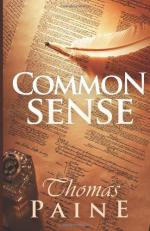Put us, says some, on the footing we were on in sixty-three: To which I answer, the request is not now in the power of Britain to comply with, neither will she propose it; but if it were, and even should be granted, I ask, as a reasonable question, By what means is such a corrupt and faithless court to be kept to its engagements? Another parliament, nay, even the present, may hereafter repeal the obligation, on the pretense, of its being violently obtained, or unwisely granted; and in that case, Where is our redress?—No going to law with nations; cannon are the barristers of Crowns; and the sword, not of justice, but of war, decides the suit. To be on the footing of sixty-three, it is not sufficient, that the laws only be put on the same state, but, that our circumstances, likewise, be put on the same state; Our burnt and destroyed towns repaired or built up, our private losses made good, our public debts (contracted for defence) discharged; otherwise, we shall be millions worse than we were at that enviable period. Such a request, had it been complied with a year ago, would have won the heart and soul of the Continent—but now it is too late, “The Rubicon is passed.”
Besides, the taking up arms, merely to enforce the repeal of a pecuniary law, seems as unwarrantable by the divine law, and as repugnant to human feelings, as the taking up arms to enforce obedience thereto. The object, on either side, doth not justify the means; for the lives of men are too valuable to be cast away on such trifles. It is the violence which is done and threatened to our persons; the destruction of our property by an armed force; the invasion of our country by fire and sword, which conscientiously qualifies the use of arms: And the instant, in which such a mode of defence became necessary, all subjection to Britain ought to have ceased; and the independancy of America, should have been considered, as dating its aera from, and published by, THE FIRST MUSKET THAT WAS FIRED AGAINST HER. This line is a line of consistency; neither drawn by caprice, nor extended by ambition; but produced by a chain of events, of which the colonies were not the authors.
I shall conclude these remarks with the following timely and well intended hints. We ought to reflect, that there are three different ways by which an independancy may hereafter be effected; and that ONE of those THREE, will one day or other, be the fate of America, viz. By the legal voice of the people in Congress; by a military power; or by a mob—It may not always happen that OUR soldiers are citizens, and the multitude a body of reasonable men; virtue, as I have already remarked, is not hereditary, neither is it perpetual. Should an independancy be brought about by the first of those means, we have every opportunity and every encouragement before us, to form the noblest purest constitution on the face of the earth. We have it in our power to begin the world over again. A situation,




